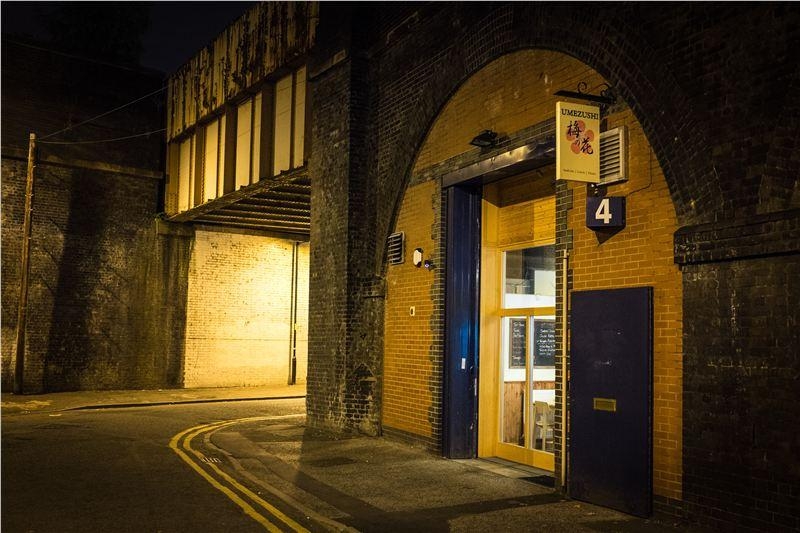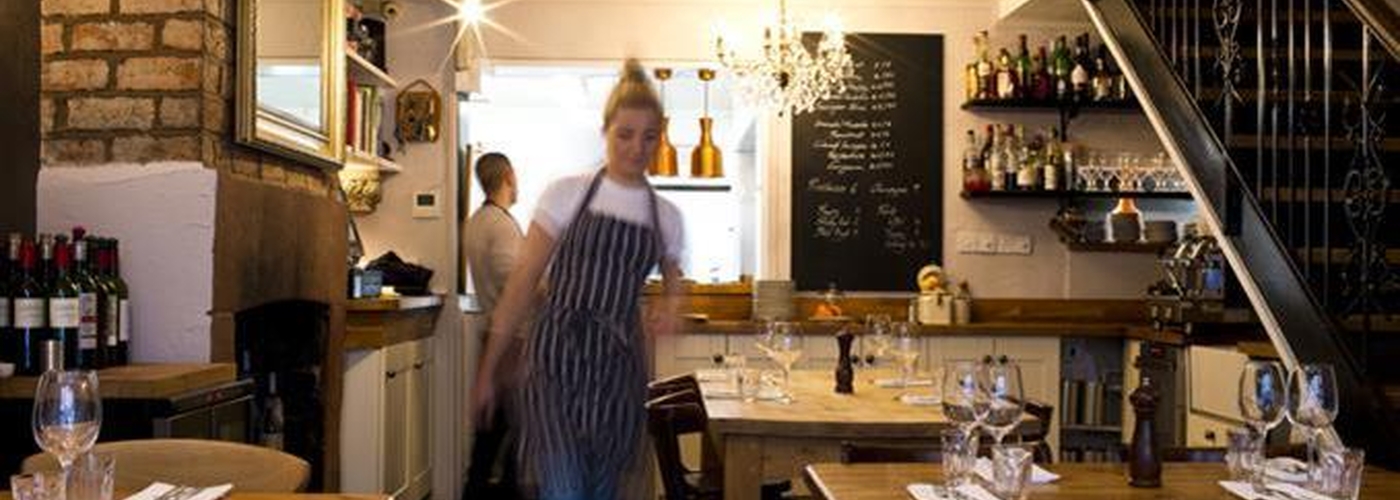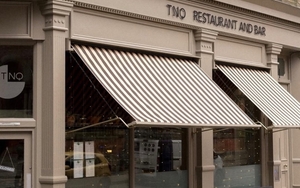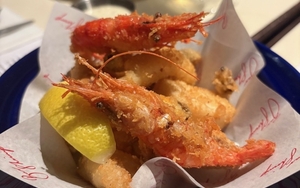David Blake speaks to Chef Gary Usher, who has taken on the ST after one of its writers scarpered without paying
"IF you eat at one of our restaurants, then you pay the bill,” says Chef Gary Usher. Fair enough. After all, he has suppliers to pay, rents to meet, and, as his bistro business grows, an increasing number of livelihoods to support.
As with many restaurants, trade over the weekend is healthy, midweek evenings are steady, whilst midweek lunch can often be a write-off. So much so, Usher – the chef-patron behind Sticky Walnut in Chester, Burnt Truffle in Heswall, and Hispi in Didsbury - has oft taken to tweeting photos of his restaurants empty, offering a brutally honest account of life at the coal face of the restaurant industry.
Despite the challenges, though, Usher, through hard graft, a savvy, self-deprecating, often sweary social media presence, and hundreds of thousands in crowd-funded dosh, has managed to grow his ‘Elite Bistros of the World’ (“I purposely picked a shit name to wind my brother up”) from one venue in 2011 to four in 2017, picking up a clutch of awards (including the AA Guide’s ‘UK Restaurant of the Year 2014’ for Sticky Walnut in Chester) and splashes in the national press along the way.
Though it's clear to the thousands of loyal punters, followers and backers who’ve helped Usher and co. on their journey via unsuccessful bank meetings to staff no-shows and very public spats (this chef is no stranger to a social media shit storm) that it’s often been touch and go. “I once had to choose between buying an oven or buying chairs,” he tells me.
So when he is approached by the usual giddy flock of food blaggers, offering him a favourable ‘review’ in return for free grub, he understandably gets riled. Still, this practice has come to be expected from those who’d use column inches (and this is by no means restricted to bloggers) and crowd-sourced review sites such as Trip Advisor and Yelp as a platform to squeeze restaurants for freebies.
But this wasn’t something Usher expected to encounter in recent dealings with a leading weekend national newspaper.
Over the past few years, Sticky Walnut has featured in many national dining guides, including a number in The Sunday Times, from the UK's best new restaurants to the best Sunday roasts. “When we first appeared in the ST, wow, we were just so proud... we didn't even know they'd been in,” he says.
So when he was contacted by a writer from the paper in October asking to ‘sample the menu’ for the ST's Top 100 Restaurants 2017 list, Usher was understandably chuffed, but also a touch uneasy. “It was the wording of the email, I just had this feeling that they wanted to eat for free,” says Usher.
Sure enough, after working his way through three courses, the man from the ST dropped his dessert spoon, thanked the staff and walked straight out the door.
“Firstly, we can’t afford to give away free food. Secondly, I just didn’t feel right about it,” says Usher. “By covering the cost of the lunch we’d effectively be buying our entry in the list – which we’ve never done before and would never get involved in.”
In previous years, the ST Top 100 Restaurants has been published in association with UK restaurant guide, Harden’s, which bases its results on the findings of its readers, not on the judgements of individual critics. This year the paper had decided to draw up its own list, advised by a ‘panel of industry experts’ (including Jamie Oliver, Antonio Carluccio and the late AA Gill) and written by its own team of food writers, which explains why Usher was, unlike previous visits, alerted beforehand.

“We’re so proud of every award and every bit of positive press we get, but we’re not willing to pay for it. That’s a matter of integrity. I decided we no longer wanted to be considered for the ST Top 100 list and tweeted them.”
Following a missed telephone call from the newspaper, Usher received an email from the guide’s editor… but not the one he was expecting.
“I wasn’t expecting a grovelling apology, just an explanation of why their writer expected not to pay,” explains Usher. “What I received was this: ‘if you didn’t want to offer a meal to a ST journalist, you just had to say’. Just had to say? What? This is The Sunday Times for fuck sake. I need to remind them that when you eat in a restaurant you usually pay for it? My own mum pays for dinner.”
Once Usher’s tweeted rejection of the Top 100 list began to pick up speed, he received another email from the paper, this time striking a more conciliatory tone and offering to reimburse him for the price of the meal.
“I’m still not sure calling them out was the right decision, but following the amount of support we got on social media I think they felt they had to come back and offer to pay.”
So did they?
“No, I left it. But I wish I had asked for the money,” says Usher, “because if Sticky now makes the Top 100 I’ll have a clear conscience… we won’t have paid for anything.”
Needless to say, when The Sunday Times Top 100 Restaurants was published on Sunday 5 February, Sticky Walnut was nowhere to be seen.
Confidential contacted the ST’s supplements editor, Karen Robinson, for an explanation as to why a newspaper owned by the Murdoch family (worth $12.3 billion and counting) thought it fair to stiff a small bistro owner for thirty quid. She said:
“The Sunday Times does not offer inclusion in its Top 100 Restaurants list in return for a free meal. This suggestion is without foundation and the chef who made it has simply misunderstood how newspapers habitually operate.
“We were, in this instance, not clear enough at the outset about our policy: ie, we are prepared to pay when that is required, and for small independent places we wouldn’t even ask for hospitality. In this case, this was not stated clearly enough.’ (read the ST’s full response here).
Habitually operate? The suggestion here being that The Sunday Times considers it routine not to pick up the bill at a prospective Top 100 restaurant unless specifically requested by the restaurant, or, as Robinson puts it, when payment ‘is required’. Which, you could say, shows a deep misunderstanding of the way restaurants ‘habitually operate’ - they cook the food, you eat the food, you pay for the food.
It’s no wonder restaurant owners such as Usher have been left feeling confused: do you take the hit, swallow your pride, and allow the ST their free ride in the hope that you’ll make the cut? Or, do you stick your chin out, ask them to pick up the bill and potentially risk your spot?

We approached a top Northern restaurant PR professional (who wished to remain anonymous) to get their take on it all. They said:
“I have sympathy for both, with increasingly tight newspaper budgets and the challenge of making a small independent neighbourhood restaurant stack up, it's a difficult world to navigate. One can argue that it’s buying inclusion in a guide, but it’s more a case of play the game or refuse on principle.
“I would never expect a restaurant to offer a complimentary meal to a national reviewer, but these top lists are more of a challenge, as they are a recommendation of where is good to eat and often compiled by freelancers. Everyone knows freelancing is a precarious business and to fund meals at all 100 restaurants would be a challenge, even for The Sunday Times.
“Still, the journalist should have been upfront about his expectations of a free meal. Usher refused to play the game and won a whole new one on social media.”
She's probably right, Sticky Walnut are likely to have pulled in as many bookings from the Twitter spat than from any Top 100 list. Still, this chef's refusal to play the game does raise some interesting questions around the guide's objectivity. How many of the Top 100 meals did the ST actually pay for? Is requesting a free lunch not in fact requesting a form of payment? And, if none of the Top 100 restaurants did request payment, is the guide not then sponsored by the restaurants it features?
Follow @David8Blake on Twitter















